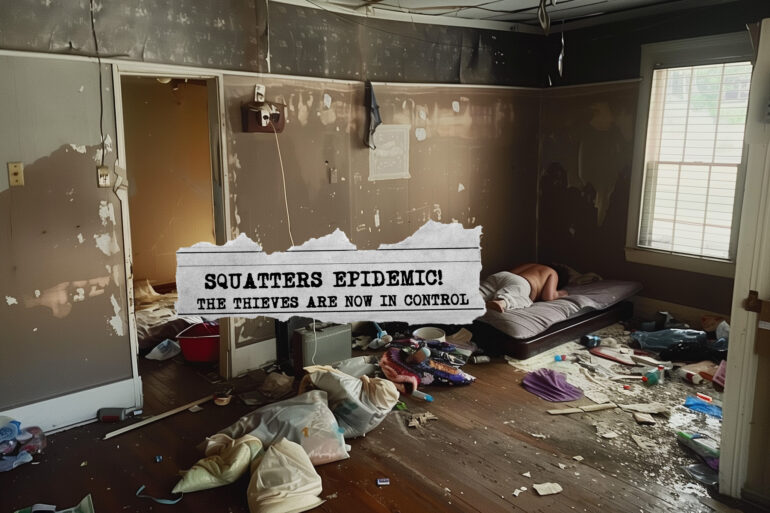The Squatter Epidemic: The Thieves Are in Control
What happens when thieves are treated like victims, commit crimes without consequences, and get paid for it all? Real estate investors have been finding out in recent years that squatters go unpunished.
Some Californians are taking matters into their own hands and are looking for loopholes to get squatters out of their properties. It’s not as simple as pointing out a thief and justice being served.
It can take months or even years to remove a squatter from a property. Not only will landlords lose rent, but they also incur significant legal fees that can be more expensive than a down payment on a property in an HCOL area. Criminals are running the show with legal backlogs and complexities backing up cases.
Squatting accelerated due in part to the government’s response to the pandemic, but that’s not the only contributing factor.
The Policies That Got Us Here
Squatters have become more prevalent in recent years, especially during the pandemic when the #CancelRent movement was in full swing. Tenants got to evade rent payments for more than a year. The Tenant Safe Harbor Act, Chapter 127 of 2020, allowed tenants to avoid making rent payments from March 7, 2020, to January 15, 2022. The tenant simply had to prove that they endured financial hardship due to the pandemic.
Not only did the law allow tenants to avoid rent payments, but it also prevented landlords from evicting tenants. When the law favors tenants this much, it’s easier to embrace a squatter mentality and avoid as much rent payments as possible.
Squatting accelerated due in part to the government’s response to the pandemic, but that’s not the only contributing factor. Squatters have been around since before the pandemic, and that’s because of how they are classified.
Adverse possession is the main culprit that has enabled squatters. The premise of this law is that land should not sit idle since there is a housing shortage. Someone can move into a neglected property, make improvements, and then acquire the property’s title after enough time has passed.
The policy is already questionable since it allows someone to take property that they didn’t pay for. However, it gets worse when considering the quality of the property. Adverse possession doesn’t only apply to broken-down properties. Squatters can use this policy to infiltrate modern properties and attempt to establish ownership after enough time has passed.
Squatter’s rights are another catalyst that has put criminals in control. The timeline varies for each location, but if someone squats in an NYC unit for 30 days, that person obtains squatter’s rights. These rights make them similar to a tenant, which makes it more complex to get rid of them. Police officers can’t remove the so-called tenant with force anymore, and you will have to go through a complex legal process to remove the squatter.
These are some of the policies that caused the current predicament for landlords. It’s even possible for squatters to own properties outright.
Police can’t remove squatters in many states.
How Squatters Become Property Owners
Some squatters get caught after a few months, and a legal battle ensues. As if stealing a home wasn’t enough, these squatters will often work with free attorneys on the taxpayers’ dime. It’s an expensive process, and some landlords end up buying out squatters instead.
However, many states and cities have expanded tenant rights, which have also extended to squatters. These laws were passed as a response to the housing affordability crisis. It has now created a crisis for landlords and offers less incentive for people to invest in rental properties or develop them.
Squatters look for vacant rental properties online and break into them. George McCleary showed the process in a viral video where he demonstrated how squatters operate. McCleary is a real estate investor and developer who wanted to highlight this issue. He explains the process of faking a lease and putting the utility bills in his name.
The rental property’s door is usually locked, but that doesn’t matter for a squatter. They can watch YouTube videos that show them how to break into a lockbox and get into the home. Once squatters get into the property, they start counting the days. Squatters in California can own a property after residing in it for five years and paying property taxes during that stretch.
Squatters will look for properties that are listed online for several months without much traction.
The Transfer of Wealth
Squatters aren’t only getting free rent for a few months or years, but they can also destroy the properties that they occupy. Squatters can use drugs in your place even if you do not approve, and some of them get very creative.
For instance, one squatter turned a property into an illegal strip club that included live horses. That’s not only ruining the landlord’s property, but it also makes the neighborhood less desirable. Squatters can also sell the homeowner’s furniture and other items to pay property taxes if they want to eventually own the home.
Police can’t remove squatters in many states. You’ll have to take them to court or exploit a loophole, like some Californians are doing. Some of these court battles can take years, and you’ll also get stuck with big utility bills after you remove the squatter from your property. Homeowners still have to pay property taxes and insurance even if they cannot access their properties.
Squatters are financially incentivized to participate in a system that gives them free housing and access to more money. Small landlords get hit the hardest, as they can burn through retirement money to repair damages and kick squatters out of their homes. Corporations can withstand squatters more easily, have more protective measures in place, and can accumulate real estate properties that small landlords have to abandon.
This isn’t only a problem in the United States. A squatter successfully secured ownership of a home in London after residing in it long enough. The squatter then sold the property for £540,000. The judge admitted that the squatter committed a criminal trespass, but that did not change the ruling.
Blue cities tend to have the most expansive tenant rights that give squatters free rein. Red states tend to have favorable laws for landlords.
Defending Your Home from Squatters
Squatters go unpunished for longer than they should and get to do as they wish to someone else’s property. Nothing about this is moral or justified, but it’s becoming a growing part of the real estate landscape. If you want to retire with your real estate portfolio and generate steady cash flow, you have to keep your properties safe from squatters.
Real estate investors should always make the property look as if it is occupied. Grass that is more than one foot tall can indicate the property isn’t occupied. Envelopes at the door tip people off that the property has a tenant. While squatters have immense protection when they invade unoccupied homes, those legal safeguards go away if a tenant or the homeowner is on the property.
Squatters will look for properties that are listed online for several months without much traction. If you keep your listing up for a few months, you might want to invest in more security measures and have property management periodically check in on the property. Putting several locks on the door and using timed interior lighting can also keep squatters away.
If a squatter gets on your property, you should call the police and let them know that your property has a trespasser. You’ll also have to rush to get legal counsel since squatters can legally own your property if they reside in it long enough.
Real estate investors should stay vigilant once they remove a squatter from their property. Some squatters return to their targets and start the entire process all over again. Your property doesn’t have any additional safeguards if a squatter just received the boot compared to a property that hasn’t had a squatter.
Location Matters
You can also shield your real estate portfolio from squatters by avoiding certain areas. Blue cities tend to have the most expansive tenant rights that give squatters free rein. Red states tend to have favorable laws for landlords.
Florida Governor Ron DeSantis recently passed a law that has strengthened property owners’ protections while increasing the penalties for squatters. The law aims to end the squatter scam in Florida. It allows sheriffs to immediately remove unauthorized inhabitants from a property. Florida is leading the way by restoring rights to property owners.
Even in Florida, it’s still good to have security measures in place and make the property look like it is inhabited even when it is vacant. Real estate investors should closely monitor how other states deal with the tenant problem. Right now, there’s a bigger incentive for landlords to invest in Florida real estate versus states like California that open up the red carpet for squatters.








